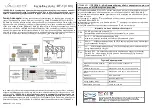UM10503
All information provided in this document is subject to legal disclaimers.
© NXP B.V. 2012. All rights reserved.
User manual
Rev. 1.3 — 6 July 2012
722 of 1269
NXP Semiconductors
UM10503
Chapter 26: LPC43xx Ethernet
26.7.3 IEEE 1588-2002 timestamps
The IEEE 1588-2002 standard defines a protocol, Precision Time Protocol (PTP), that
enables precise synchronization of clocks in measurement and control systems
implemented with technologies such as network communication, local computing, and
distributed objects. The PTP applies to systems communicating by local area networks
supporting multicast messaging, including (but not limited to) Ethernet. This protocol
enables heterogeneous systems that include clocks of varying inherent precision,
resolution, and stability to synchronize. The protocol supports system-wide
synchronization accuracy in the sub-microsecond range with minimal network and local
clock computing resources.
The PTP is transported over UDP/IP. The system or network is classified into Master and
Slave nodes for distributing the timing/clock information.
PTP uses for synchronizing a slave node to a master node by exchanging PTP
messages.
0
1
1
0
Rx has priority over Tx in the ratio 4:1.
1
x
x
1
Tx always has priority over Rx.
1
0
0
0
Tx and Rx have equal priority. Tx gets the access first on
simultaneous requests.
1
0
1
0
Tx has priority over Rx in the ratio 2:1.
1
1
0
0
Tx has priority over Rx in the ratio 3:1.
1
1
1
0
Tx has priority over Rx in the ratio 4:1.
Table 575. Priority scheme for transmit and receive DMA
Bit 27
Bit 15
Bit 14
Bit 1
Priority scheme


















